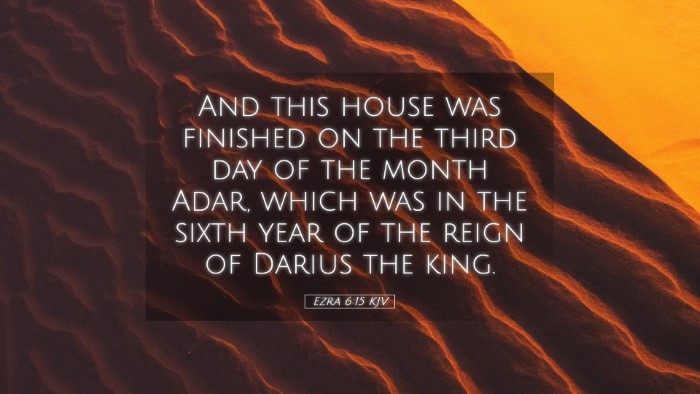Old Testament
Genesis Exodus Leviticus Numbers Deuteronomy Joshua Judges Ruth 1 Samuel 2 Samuel 1 Kings 2 Kings 1 Chronicles 2 Chronicles Ezra Nehemiah Esther Job Psalms Proverbs Ecclesiastes Song of Solomon Isaiah Jeremiah Lamentations Ezekiel Daniel Hosea Joel Amos Obadiah Jonah Micah Nahum Habakkuk Zephaniah Haggai Zechariah MalachiEzra 6:15
Ezra 6:15 KJV
And this house was finished on the third day of the month Adar, which was in the sixth year of the reign of Darius the king.
Ezra 6:15 Bible Commentary
Commentary on Ezra 6:15
Ezra 6:15 states:
"And this house was finished on the third day of the month Adar, which was in the sixth year of the reign of Darius the king."
Introduction
The verse encapsulates the momentous completion of the temple in Jerusalem, a project fraught with adversity and divine providence. Various commentaries provide insights that highlight its significance in Jewish history and theology. A synthesis of these texts offers valuable perspectives for pastors, students, theologians, and scholars.
Historical Context
This construction coincides with the return of the Jewish exiles from Babylon, instigated by the edict of Cyrus. Henry notes that the rebuilding of the temple is a fulfillment of prophetic words and a divine promise to restore worship in Jerusalem. The context of Darius’ reign marks a pivotal historical period where the Jewish people reestablish their national identity and worship post-exile.
Significance of the Date
Ezra mentions the specific timing of the temple's completion:
- Third Day of Adar: This period in the Jewish calendar holds historical significance as Adar is typically associated with joy and victories, reflecting God's faithfulness in restoring His people.
- Sixth Year of Darius: This signifies a notable era in Jewish history—Darius’ support was crucial in overcoming opposition and providing resources, enabling the Jews to fulfill their religious duties.
Spiritual Implications
Albert Barnes connects this historical milestone to deeper spiritual ramifications:
- Restoration of Worship: The completed temple symbolizes the restoration of right worship and the presence of God among His people. It reestablishes the centrality of worship in their lives, aiding in the Israelite's identity as God's chosen people.
- Faith Against Opposition: The adversities faced during the rebuild underscore not only the perseverance of the Jewish people but also God's sovereignty and support through trials.
Role of Leadership
Adam Clarke emphasizes the significance of leadership in this endeavor:
- Leadership of Zerubbabel and Jeshua: Their roles are pivotal in navigating the challenges of rebuilding both the physical structure and the community's faith.
- Divine Endorsement: The completion of the temple underlines the importance of God’s appointed leaders in the unfolding of divine plans and the assurance that God’s purposes will prevail.
God's Faithfulness
Throughout this narrative, the theme of God's faithfulness resonates. Matthew Henry notes:
- Fulfillment of Promises: The construction and eventual completion of the temple fulfill the promises God made to His people, signifying that God's covenant is unbroken despite their previous disobedience.
- Presence of God: The temple serves as a locus of God's presence, fulfilling His pledged commitment to dwell among His people, reaffirming the importance of His holiness and worship.
Lessons for Today
The implications of Ezra 6:15 extend into current faith practice:
- Commitment to God's Work: Just as the Israelites committed themselves to rebuild the temple, contemporary believers are called to invest in God's work, supporting the mission of the church.
- Endurance in the Face of Trials: The determination displayed during the rebuilding reflects a vital lesson for modern believers—endurance in faith amidst adversity is paramount to realizing God’s promises.
- Renewal of Worship: This passage encourages the modern church to reflect on the significance of consistent worship and the central role it plays in their community and spiritual life.
Conclusion
Ezra 6:15 stands as a powerful reminder of God’s faithfulness, the importance of worship, and the role of dedicated leadership in fulfilling divine purposes. The completion of the temple is not merely an ancient historical note, but a crucial moment that reverberates through time, encouraging the faithful to trust in God’s ongoing work in their lives and communities.


